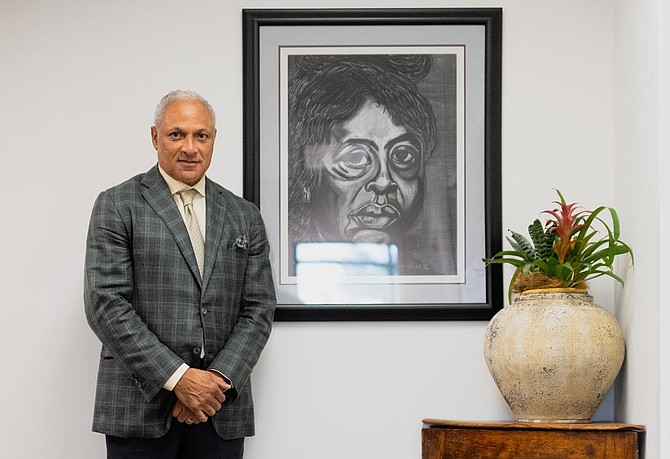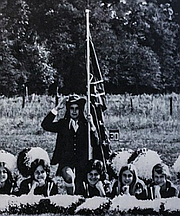Mike Espy gave the Jackson Free Press a tour of his work office in 2018, where hangs a portrait of historic Mississippi civil rights leader Fannie Lou Hamer—one of his personal heroes. Photo by Ashton Pittman
Democrat Mike Espy has a plan to win in Mississippi, he told the Jackson Free Press Tuesday morning, soon after officially launching his 2020 campaign for U.S. Senate. Last year, the former U.S. secretary of agriculture came within four points of beating Republican Sen. Cindy Hyde-Smith in a special election to fill the seat that longtime Sen. Thad Cochran had vacated.
"We plan to correct our mistakes," Espy told the Jackson Free Press. "And one of the mistakes that we made in 2018 was that I thought everyone knew me."
In the social-media video he used to launch his campaign, Espy, who is African American, opens with the story of his great-grandparents.
"My great-grandparents were slaves, brought to Mississippi from Georgia and Virginia," his voice intones. "But their son, my grandfather, Thomas Jefferson Huddleston Sr., founded the first hospital for African Americans in Mississippi because he believed black women should give birth on comfortable beds and on clean sheets—instead of in the cotton fields."
In 1986, Mike Espy became the first African American from Mississippi to serve in the U.S. House of Representatives since Reconstruction, though the state still has not elected a black U.S. senator since that era. He told the Jackson Free Press that the message is simple:
"I am the legacy of my grandfather who, in much more difficult times, succeeded in organizing his community and promoting uplift among people who were former slaves," he said. "The lesson is, if they can do it in a much more difficult period, then certainly we have no complaints—we can do it."
Epsy said in the interview that he wants to connect his history with today's urgent issues in Mississippi.
"I lead with the story of my grandfather to let them know that someone who built a hospital has a grandson now who can keep rural hospitals from closing," he explained. "And someone who exhorted former slaves to stay in high school and not drop out is someone who can exhort students to pay down student debt and graduate from college. ... So the idea is to remind them of my legacy, to remind them of my service, and to create a story of what I can become and what I can do as senator."
'Because She Said It, It Came Out of Her Mouth'
Espy spent most of 2018 running an issues-oriented race, only heavily criticizing Hyde-Smith in the last month of the campaign, after two damaging videos emerged that rocked the campaign in the final stretch. In the first video, which Louisiana-based journalist Lamar White Jr. published on his news site, Bayou Brief, and then the Jackson Free Press reported, Hyde-Smith used a strange phrase to praise a supporter that many took as a reference to lynching.
"If he invited me to a public hanging, I'd be on the front row," she said, referring to a man who showed up to see her at a campaign rally in Tupelo.
The comment caused a national uproar. At a debate weeks later, she said she was sorry "if" she had offended anyone, but quickly blamed her African American opponent for the commotion, accusing him of using it for his own political benefit. The Jackson Free Press asked Espy why he decided to remind voters of her remark in his launch video.
"Because she said it, it came out of her mouth," he said. "And she never really apologized for that. I think what she said was wrong. She's just not the right person for the Mississippi of the future. And she doesn't fit the right image for the Mississippi of the future that I want to represent."
Hyde-Smith Attended All-White ‘Seg Academy’ to Avoid Integration
The story that created a national dialogue on school segregation, then and now.
A month after the election ended, Hyde-Smith temporarily presided as the U.S. Senate passed, for the first time in history, an anti-lynching law. It did not take effect, though, because the House did not agree to pass the bill before a new Congress took over in January. When Espy saw her presiding, he said he knew it was an attempt to clean up her image.
"I laughed about it," he said in today's interview. "I thought it was an obvious attempt to overcome what they may have considered to be a grievous error. It was the right thing to do. But the fact that they chose her to preside over the Senate when that was done was obvious."
A linguist told The New York Times last year that the "public hanging" idiom was one that was used during the time when lynchings of African Americans were common. It was used during the late 1800s and fell out of favor sometime around the mid-20th century. During the time it was part of common usage, Mississippi had the highest rate of African American lynchings in the country.
Seg Academies and Voter Suppression
In the 1970s, though, the phrase was apparently still in use at Hyde-Smith's high school, Lawrence County Academy—a segregation school that was hastily put together in 1970 so white families could avoid sending their children to public schools with black children after a 1969 U.S. Supreme Court ruling ordered immediate desegregation. Hyde-Smith was well into her education when her family transferred her to the academy.
Her former basketball coach there, Congressman Ronnie Shows, told the Jackson Free Press that he remembered hearing the "public hanging" saying during his time there.
The Jackson Free Press also reported that, years later, after Lawrence County Academy closed, Hyde-Smith enrolled her daughter in nearby Brookhaven Academy, a private school that also opened in 1970 as a segregation academy. Even to this day, Brookhaven Academy is almost all-white. In the 2015-2016 school year, Brookhaven Academy enrolled 386 white children, five Asian children and just one black child, the National Center for Education Statistics shows—despite the fact that Brookhaven is 55 percent black and 43 percent white.
Espy's ad also highlights another video that White obtained and posted last year, in which Hyde-Smith appeared to suggest it would be a good idea to suppress the vote of some college students.
"And then they remind me, that there's a lot of liberal folks in those other schools who that maybe we don't want to vote," Hyde-Smith said, though it was not clear which "other schools" she meant. "Maybe we want to make it just a little more difficult. So, I think that's a great idea."
Her campaign said at the time that the senator was joking.
Espy told the Jackson Free Press his team is already working on strategies to overcome systemic voter suppression.
'A Coalition of All Races'
Espy has at least one luxury on his side that he did not have last year: time. In 2018, he launched his campaign in March, immediately after Cochran announced his resignation. That gave him little time to put together a campaign ahead of the special election in November. Though his campaign was not fully on the ground until late August, he still managed to raise over $7 million and put together what he called a "modern" campaign by Mississippi standards.
"So we did well ... but we really didn't have time to organize a grass-roots effort," he said today, adding that it will be up to him to persuade people to put money into his second campaign for the seat and convince them that he can win.
His team spent the entire summer planning for this campaign, he said, crunching the numbers with data experts to figure out what went wrong and what he needs to do differently this time. ahead of the November 2020 elections. On-the-ground efforts, he said, will prove vital to turning out voters who did not show up at the polls last time.
Though Mississippi is 38% African American, the Espy campaign's post-mortem analysis found that 32.5% of the 2018 electorate was black. That was slightly lower than 2016, when 33% was black, and well below 2012, when African Americans made up 37% of the electorate in Mississippi. Since 2020 is a presidential year, Espy expects African American turnout will be higher, and plans to have teams on the ground to ensure it by getting out the vote.
‘It Only Matters What You Answer To’: The JFP Interview with Mike Espy
Mike Espy spoke to the Jackson Free Press about both his history and his approach to his 2018 campaign.
That will not be enough though, he said, adding that he knows he will have to build "a coalition of all races" that will include some Republicans. Recently, he traveled to the Mississippi Delta to meet with white farmers who he said were all age 50 and older.
"I went myself, and I sat with them for two hours asking, really, did they forget me?" he recalled, saying he pointed out trade deals be negotiated as U.S. agriculture secretary that have helped Mississippi farmers.
"We believe you would vote on our issues," he recalled the farmers telling him. "We really believe you are more conversant with agriculture policy than Cindy Hyde-Smith. But are you going to vote with (Democratic Senate Minority Leader) Chuck Schumer?"
The conversation then, he said, veered into other non-agriculture-related areas where the white farmers had concerns Espy might vote with the Senate's more liberal members.
"That's why I told them, 'There's no vote with Chuck Schumer that's going to be guaranteed with Mike Espy,'" he said.
Espy courted farmers in 2018, arguing against President Donald Trump's Chinese tariffs, which invited retaliatory tariffs that have hit Mississippi farmers particularly hard.
'I'm Not Running Away from the Party'
While he is reaching out, though, Espy said he is not trying to distance himself from the Democratic Party.
"I'm not running away from the party, I'm a Democrat, certainly, but I'm an independent Democrat," he told the Jackson Free Press. "Chuck Schumer cannot take my votes for granted."
In this year's race for governor, Democrat Jim Hood drew criticism for not inviting popular national Democrats, like former President Barack Obama, to campaign with him, even as now Gov.-elect Tate Reeves held rallies with President Donald Trump and Vice President Mike Pence. Some Democrats in red states, like Mississippi, have decided against bringing in Obama, whom they fear, despite his popularity among black voters, might drive away conservative white voters.
Espy said he would be open to a visit from Obama or other national Democrats.
"I'm going to bring in everyone who I think can help me," he said. "I don't know whoever would want to come, but we're going to certainly look at it. But I wouldn't oppose it," he told the Jackson Free Press today.
FEC filings show Espy's U.S. Senate campaign committee has already spent $262,870 getting prepared for the 2020 election, though some of that includes donations to 2019 candidates in Mississippi. He has raised $61,546.81. Hyde-Smith, who kicked off fundraising efforts early this year, has already raised nearly $1 million and spent $453,878.
Potential Democratic primary opponents have until the March filing deadline to join the race.
Espy endorsed several Democrats running in Mississippi legislative races this year, helping them with funding, get-out-the-vote efforts and providing them with campaign data from his 2018 bid. Those candidates include Brandon Rue, who lost to incumbent Republican House Rep. Missy McGee on Nov. 5, and Shanda Yates, who is still waiting on a provisional ballot count to find out whether or not she succeeded in beating 30-year incumbent GOP House Rep. Bill Denny.
Follow State Reporter Ashton Pittman on Twitter @ashtonpittman. Send tips to [email protected]. Read our award-winning 2018 election coverage at jfp.ms/2018elections. Follow the 2020 campaign at jfp.ms/2020elections.
More stories by this author
- Governor Attempts to Ban Mississippi Abortions, Citing Need to Preserve PPE
- Rep. Palazzo: Rural Hospitals ‘On Brink’ of ‘Collapse,’ Need Relief Amid Pandemic
- Two Mississippi Congressmen Skip Vote on COVID-19 Emergency Response Bill
- 'Do Not Go to Church': Three Forrest County Coronavirus Cases Bring Warnings
- 'An Abortion Desert': Mississippi Women May Feel Effect of Louisiana Case





Comments
Use the comment form below to begin a discussion about this content.
comments powered by Disqus